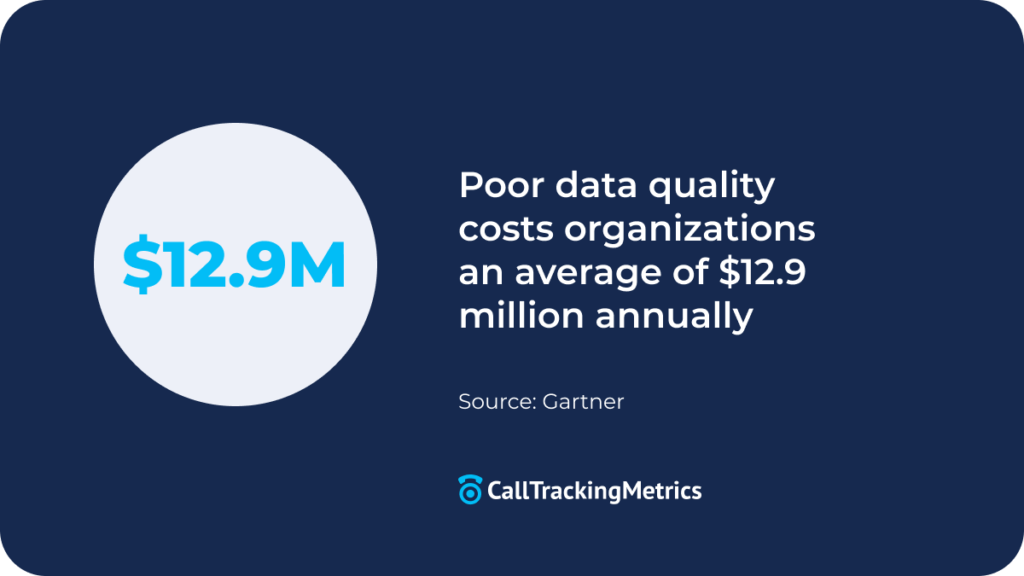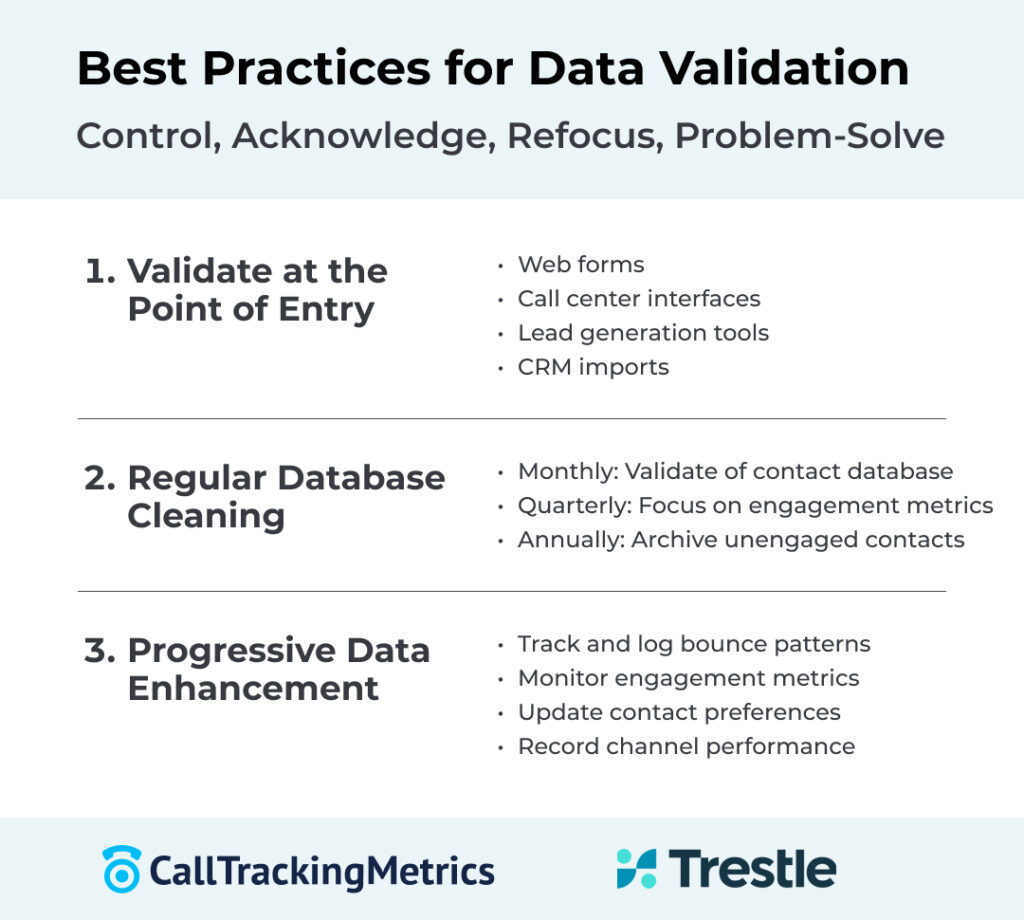Boost Your SMS and Email Campaign Performance with Data Validation
Guest Post by Lainey Stevens at Trestle
Imagine spending weeks working on your latest marketing campaign. You craft the perfect marketing message, design a beautiful email template, and hit send, only to watch your bounce rates soar and engagement metrics plummet. If this sounds familiar, you might be overlooking one of marketing’s most underappreciated strategies: data validation.
For marketing, the challenge isn’t only about collecting data but ensuring its accuracy and reliability. In the past few years, data validation has emerged as a practice for marketers aiming to maximize the effectiveness of their SMS and email campaigns because inaccurate data can lead to wasted resources, as well as potential damage to brand reputation.
The Cost of Bad Data
Picture this: You’re a chef preparing a meal, but half your ingredients are spoiled. No matter how excellent your cooking skills are, the final dish won’t meet expectations. The same principle applies to your marketing campaigns. Your creative might be brilliant, your timing perfect, but if your contact data is “spoiled,” your results will suffer.
Research by Gartner suggests that poor data quality costs organizations an average of $12.9 million annually. But here’s the good news: implementing data validation can greatly improve your marketing performance, and here’s how.

What Exactly Is Data Validation (And Why Should Marketers Care)?
Data validation is the process of ensuring your contact information is accurate, up-to-date, and formatted correctly. Think of it as your database’s quality control system. It involves checking data for errors, inconsistencies, and inaccuracies before it is processed or analyzed.
For marketers, data validation serves three crucial purposes:
- Protecting your sender reputation and deliverability
- Improving campaign performance metrics
- Maximizing return on marketing investment (ROMI)
Because marketing campaigns for SMS or email rely heavily on accurate data, their success hinges on reaching the right audience. Invalid phone numbers or email addresses in your CRM can result in undelivered messages, higher bounce rates, and poor engagement metrics.
The Building Blocks of Effective Data Validation
Email Validation: Beyond the Basics
Email validation goes beyond only syntax checking. If an email reaches the recipient’s inbox, email can be one of the most effective digital marketing strategies. A comprehensive email validation strategy should include:
- Syntax Verification: Ensures that email addresses are formatted correctly.
- Format checking (presence of @ symbol, valid domain structure)
- Character set validation
- Length restrictions
- Domain Validation: Checks the domain of the email address to ensure it exists and is active.
- MX record verification
- Domain existence checking
- Top-level domain (TLD) validation
- Mailbox Verification: Confirms that the email address is associated with an active mailbox.
- SMTP verification
- Catch-all domain detection
- Disposable email address identification
SMS Data Validation: Getting Mobile-Ready
SMS data validation offers a direct line of communication with customers, but it also demands precise data to maintain sender reputation, confirm compliance, and avoid sending messages to inactive or disconnected numbers. For SMS marketing, proper validation includes:
- Number Format Validation: Validates that phone numbers are in the correct format according to the country code.
- Country code verification
- Local number format compliance
- Number length checking
- Carrier Validation: Identifies the carrier associated with a phone number, which can be useful for tailoring messages or understanding potential costs.
- Mobile carrier identification
- Landline detection
- VoIP number filtering (Differentiating between fixed and non-fixed VoIP is even better.)
- Activity Verification: Checks if a phone is currently in service, if the number has been transferred between carriers, and if the number is roaming internationally.
- Number activity status
- Porting status check
- Roaming status verification
Benefits of Data Validation in SMS and Email Marketing
Implementing data validation can improve your SMS and email marketing campaigns in several ways:
- Higher Deliverability Rates: Valid data ensures that your messages reach the intended recipients without bouncing.
- Increased ROI: By targeting the right audience, you can achieve better results from your marketing spend.
- Improved Customer Experience: Accurate data allows for personalized and relevant communication.
- Reduced Compliance Risks: Ensures that your marketing practices align with data protection regulations.
- Better Analytics: Clean data leads to more accurate campaign performance analysis.
Best Practices for Implementation
1. Validate at the Point of Entry
It’s important to not wait until you’re ready to send a campaign to validate your data. Start validating your data at the first point of entry for leads coming into your CRM or database. This can be through:
- Web forms, like a sign up page or a contact page
- Call center interfaces
- Lead generation tools
- CRM imports
2. Regular Database Cleaning
Regular database cleansing is necessary to ensure your data is up-to-date. Set up a schedule for regular database maintenance:
- Monthly validation of your entire contact database
- Quarterly deep cleans focusing on engagement metrics
- Annual archiving of persistently unengaged contacts
3. Progressive Data Enhancement
Use each customer interaction as an opportunity to improve data quality:
- Track and log bounce patterns
- Monitor engagement metrics
- Update contact preferences
- Record channel performance

How Trestle and CallTrackingMetrics Can Help
Trestle and CallTrackingMetrics integration offers a data validation API that helps marketers ensure their contact data is accurate and up-to-date. Real Contact API provides comprehensive contact verification for phone numbers, email addresses, and physical addresses. This all-in-one verification solution can increase contact rates, ensure lead compliance, and help with lead contactability scoring and prioritization. With the Trestle and CallTrackingMetrics integration, marketers can enhance their SMS and email campaigns, ensuring better deliverability, engagement, and ROI.
The Future of Data Validation
As marketing technology evolves, data validation is becoming increasingly sophisticated. Machine learning algorithms can now predict email engagement probability, identify patterns in invalid data, and even suggest the best times to clean your database. The future promises even more exciting developments:
- AI-powered real-time validation
- Blockchain-based verification systems
- Enhanced privacy compliance tools
- Predictive data quality scoring
Data validation might not be the most exciting or glamorous aspect of marketing, but it’s crucial for business success. By implementing validation solutions, you’re not just cleaning data but building a foundation for more effective, efficient, and profitable marketing campaigns.
Remember: your marketing campaigns are only as good as the data that powers them. Invest in proper data validation, and watch your campaign performance metrics improve.

Lainey Stevens runs Marketing at Trestle, where she manages the Trestle blog, SEO strategies, trade shows, and more. Being in the identity data space for several years, she encourages businesses to leverage identity data to maximize their contactability, understand their customers better, and improve operational efficiency. Connect with her on LinkedIn or explore Trestle’s solutions at www.trestleiq.com.